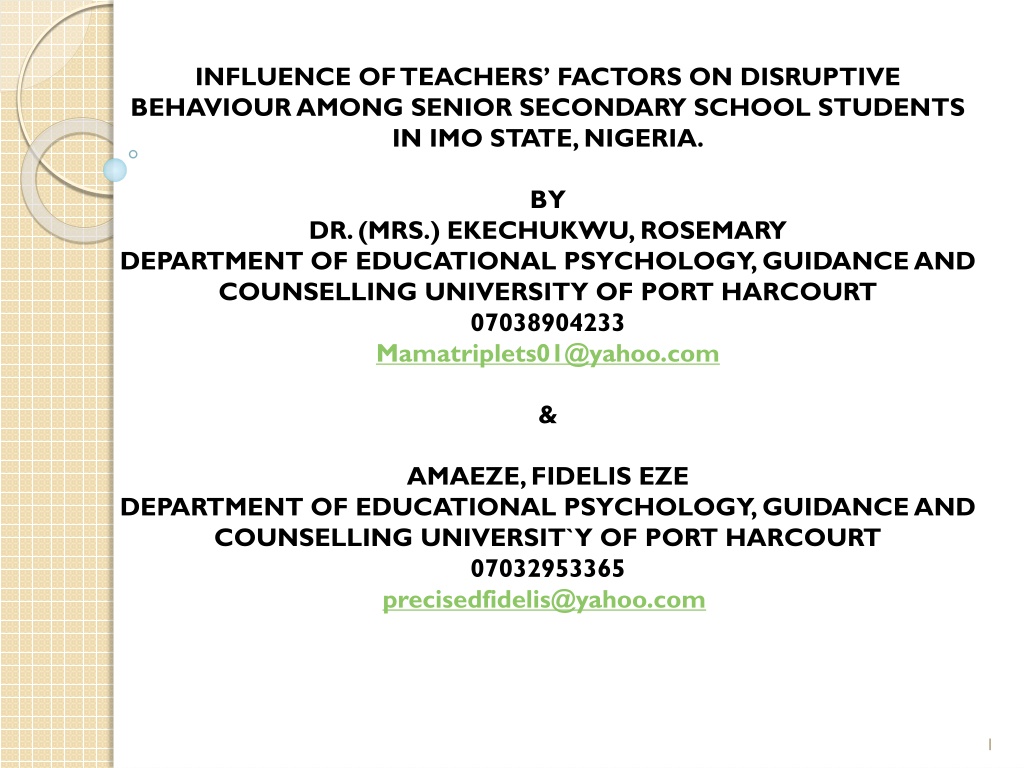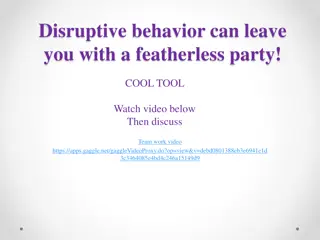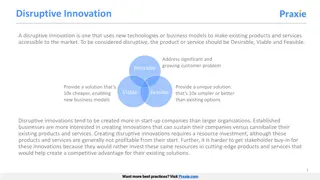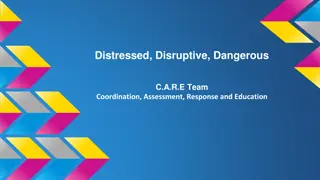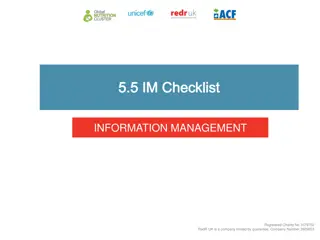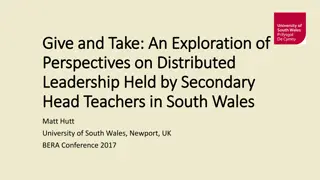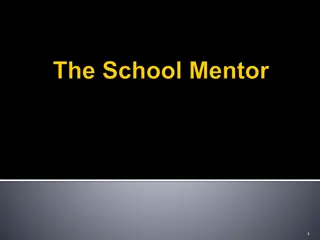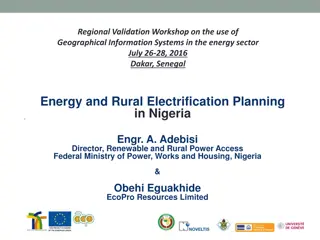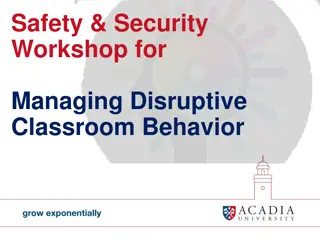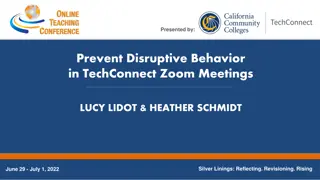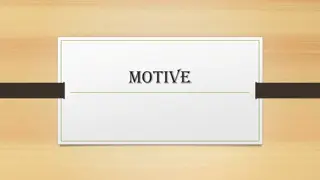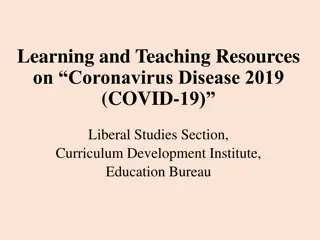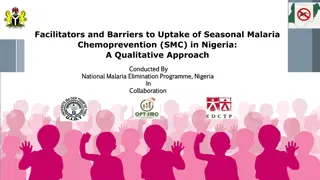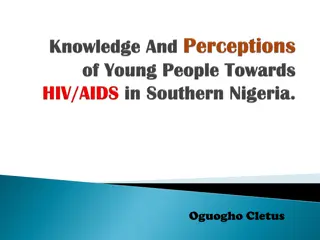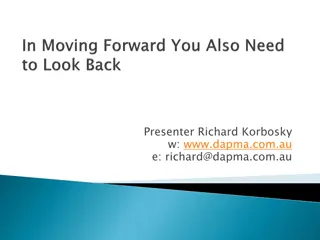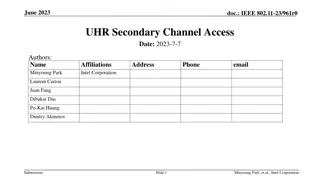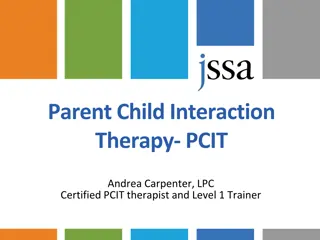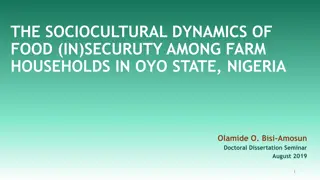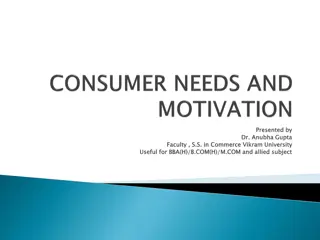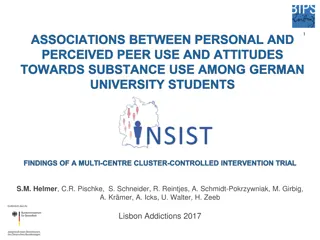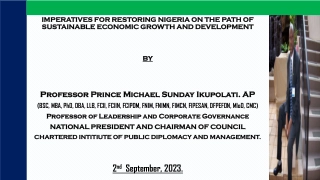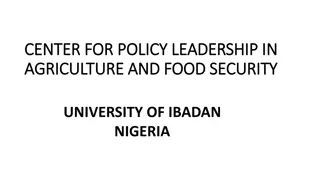Influence of Teachers on Disruptive Behavior Among Senior Secondary School Students in Imo State, Nigeria
This study examines the impact of teachers' qualifications, experience, marital status, and gender on disruptive behavior among senior secondary school students in Imo State, Nigeria. Findings suggest that teachers' qualifications and experience significantly influence student behavior. Recommendations include promoting teacher development programs and fostering mentor-mentee relationships.
Download Presentation

Please find below an Image/Link to download the presentation.
The content on the website is provided AS IS for your information and personal use only. It may not be sold, licensed, or shared on other websites without obtaining consent from the author. Download presentation by click this link. If you encounter any issues during the download, it is possible that the publisher has removed the file from their server.
E N D
Presentation Transcript
INFLUENCE OF TEACHERS FACTORS ON DISRUPTIVE BEHAVIOUR AMONG SENIOR SECONDARY SCHOOL STUDENTS IN IMO STATE, NIGERIA. BY DR. (MRS.) EKECHUKWU, ROSEMARY DEPARTMENT OF EDUCATIONAL PSYCHOLOGY, GUIDANCE AND COUNSELLING UNIVERSITY OF PORT HARCOURT 07038904233 Mamatriplets01@yahoo.com & AMAEZE, FIDELIS EZE DEPARTMENT OF EDUCATIONAL PSYCHOLOGY, GUIDANCE AND COUNSELLING UNIVERSIT`Y OF PORT HARCOURT 07032953365 precisedfidelis@yahoo.com 1
Abstract The study investigated the influence of teachers factors on disruptive behaviours of senior secondary school students in Imo state, Nigeria. Four research questions and four null hypotheses were asked. The design of the study is an ex post facto research design. The population of the study is all the 11874(1387 males and 10487 females) teachers in senior secondary school students in the 314 public secondary schools in Imo State. A stratified random sampling technique was used to draw the sample size of 1187 students using 10% of the population. A self designed instrument titled Influence of Teachers Factors on Students Disruptive Behaviour (ITFSDB). Face and content validities were ensured. The cronbach alpha reliability was used to establish internal consistency reliability of 0.77. Mean, standard deviation, independent sample z-test and One Way Analysis of Variance were used for data analysis. It was found out that qualification and experience of teachers statistically influence disruptive behaviour of students in secondary schools in Imo State, Nigeria. It was recommended among others that the Ministry of Education and the school authority should make teacher development programme important and as a prerequisite for promotion. The school system should encourage mentor mentee relationship in order for the younger teachers to understudy the superior teachers. Key words: Teachers factors and disruptive behaviour. 2
BACKGROUND TO THE STUDY Disruptive students behaviour Teacher experience Teacher qualification Teacher gender 3
STATEMENT OF THE PROBLEM Ideal teacher Character molder Curriculum implementer Role model Cheater in the classroom Deceiver in the classroom Immoral act encourager Anomaly 4
AIM/OBJECTIVES OF THE STUDY The aim of this study is to examine the influence of teacher factors on disruptive behaviours among senior school students in Imo State, Nigeria. Specifically put, the study sought to: Find out the extent teachers qualifications influence disruptive behaviour among senior secondary school students in Imo State, Nigeria. Ascertain the extent teacher s experience influence disruptive behaviour among senior secondary school students in Imo State, Nigeria. Investigate the extent teacher s marital status influence disruptive behaviour among senior secondary school students in Imo State, Nigeria. Examine the extent teacher s gender influence disruptive behaviour among senior secondary school students in Imo State, Nigeria. 5
RESEARCH QUESTIONS Based on the purpose of the study, the following research questions guided the study: To what extent does teacher s qualification influence disruptive behaviour among senior secondary school students in Imo State, Nigeria? To what extent does teacher s experience influence disruptive behaviour among senior secondary school students in Imo State, Nigeria? To what extent does teacher s marital status influence disruptive behaviour among senior secondary school students in Imo State, Nigeria? To what extent does teacher s gender influence disruptive behaviour among senior secondary school students in Imo State, Nigeria? 6
HYPOTHESES The following hypotheses were tested at 0.05 alpha level 1) There no significant difference between the extent teacher s qualification influence disruptive behaviour among senior secondary school students in Imo State, Nigeria. There is no significant difference between the extent teachers experience influence disruptive behaviour among senior secondary school students in Imo State, Nigeria. There is no significant difference between the extent teachers marital status influence disruptive behaviour among senior secondary school students in Imo State, Nigeria. There is no significant difference between the extent teacher s gender influence disruptive behaviour among senior secondary school students in Imo State, Nigeria. 7
SIGNIFICANCE OF THE STUDY The Ministry of Education will benefit from the findings of the study. Educational planners will benefit from the study. It will help principals to improvement maintenance culture in the school 8
REVIEW OF RELATED LITERATURE The literature review was done under the following subheadings: Concept of disruptive behaviour Concept of a teacher Experience of a teacher Qualification of a teacher Gender of a teacher 9
METHODOLOGY Research Design: ex post facto. Population: 11874(1387 males and 10487 females) teachers in senior secondary school students in the 314 public secondary schools in Imo State.. (Source: Imo State Ministry of Education, 2015) 10
SAMPLE AND SAMPLING TECHNIQUE Sample Size: The sample size of 1187 students using 10% of the population Sampling Technique: A stratified random sampling technique was used to draw the sample because of the strata involved in the population. 11
INSTRUMENTATION A self designed instrument titled Influence of Teachers Factors on Behaviour (ITFSDB). Section A was structured on a modified four point likert-type rating scales; that is: Strongly Agree (SA)- 4 points Agree (A)- 3 points Disagree (D)- 2 points Strongly Disagree (SD)- 1 point Students Disruptive 12
Validity: Face and content validities Reliability: Cronbach alpha (.77) 13
METHOD OF DATA ANALYSIS Mean, standard deviation, independent sample z-test and One Way Analysis of Variance were used for data analysis. 14
DATA ANALYSIS AND RESULTS CONTD research question one To what extent does teacher s qualification influence disruptive behaviour among senior secondary school students in Imo State, Nigeria? Hypothesis one There no significant difference between the extent teacher s qualifications influence disruptive behaviour among senior secondary school students in Imo State, Nigeria. Table 1: Descriptive and z-test Statistics of teacher s qualifications on students disruptive behaviour in secondary schools in Imo State. x S/N N Mea n STD Df Sig. t-cal rema rk Non qualified teachers 788 18.173 5.780 1185 0.00 2.07 sig. qualified teachers 399 12.537 5.231 15
DATA ANALYSIS AND RESULTS CONTD Research Question Two To what extent does teacher s experience influence disruptive behaviour among senior secondary school students in Imo State, Nigeria? Hypothesis Two There is no significant difference between the extent teachers experience influence disruptive behaviour among senior secondary school students in Imo State, Nigeria. Table 2: Descriptive and z-test Statistics of teacher s experience on students disruptive behaviour in secondary schools in Imo State. x Category N Sd df z-critical Remarks z- calculated Non experienced 488 22.231 4.560 sig. 1.96 1185 0.00 Experienced 699 18.447 3.131 16
DATA ANALYSIS AND RESULTS CONTD Research Question Three To what extent does teacher s marital status (single, married, separated, widowed and divorced) influence disruptive behaviour among senior secondary school students in Imo State, Nigeria? Hypothesis Three There is no significant difference between the extent teachers marital status (single, married, separated, widowed and divorced) influence disruptive behaviour among senior secondary school students in Imo State, Nigeria. Table 3a: Descriptive and z-test Statistics on the influence of marital status on students disruptive behaviours in secondary schools in Imo State. x Category N 450 567 100 45 25 1187 Mean 43.0033 25.3582 44.6567 40.4835 38.7633 192.265 Std 12.41009 11.35673 12.63337 11.08161 10.68567 58.16747 Single Married Separated Widowed Divorced total 17
TABLE CONTD Table 3b: One Way Analysis of Variance of the influence of marital status on students disruptive behaviours in secondary schools in Imo State Sum of Squares df Mean Square F Sig. Between Groups 303.687a 2 158.667 .596 .232 Within Groups 301622.148 1185 58.719 Total 311875.735 1187 18
DATA ANALYSIS AND RESULTS CONTD Research Question Four To what extent does teacher s gender influence disruptive behaviour among senior secondary school students in Imo State, Nigeria? Hypothesis Four There is no significant difference between the extent teacher s gender influence disruptive behaviour among senior secondary school students in Imo State, Nigeria. Table 4: Descriptive and z-test Statistics of teacher s gender on students disruptive behaviour in secondary schools in Imo State. x Category Male teachers N Sd 2.431 df z-calculated Remarks Sig. 21.233 647 sig. 3.11 0.01 118 5 15.425 1.456 540 Female teachers 19
CONCLUSION Based on the findings, it was concluded that non qualified teachers, non experienced teachers, single teachers, separated teacher, widowed, divorced and male teachers influence disruptive behaviours in secondary schools in Imo Sate, Nigeria. 20
RECOMMENDATIONS The Ministry of Education and the school authority should make teacher development programme important and as a prerequisite for promotion. The school system should encourage mentor mentee relationship in order for the younger teachers to understudy their superior teachers. Teachers that are single, separated, widowed and divorced should avail themselves of the opportunity of visiting the guidance and counsellor and educational administrator from time to time in order to take full control of the classroom environment and students behaviour. Teachers should be advised during orientation at the point of recruitment to see themselves as disciplinarian of the students irrespective of their gender. 21
REFERENCES Adeyemo, S.A. (2012). The relationship between effective classroom management and students academic achievement. European Journal of Educational Studies. 4(3). Retrieved 12th April 2016, from http://ozelacademy.com/ejes%204.3-6.pdf Azim, M.T., Haque, M.M., & Chowdhury, R.A. (2013). Gender, marital status and job satisfaction an empirical study. International Review of Management and Business Resea. 2(2), 1-11. Retrieved 8th April 2016, from http://irmbrjournal.com/papers/1372422726.pdf Bosco, S.M., & Bianco, C.A. (2015). Influence of maternal work patterns and socioeconomic status on Gen Y Lifestyle choice. Retrieved 5th December 2015 from jcd.sagepub.com/content/32/2/165.abstract. The Curators of the University of Missouri. Honolulu Community College (n.d). disruptive behaviour policy. Retrieved 7th April www.honolulu.hawaii.edu/facdev/guidebk/policies/disruptive.htm 2016, from 22
REFERENCES CONTD Kari, J. (2013). Educators experience with disruption behaviour in the classroom. Masters in Social Works, Clinical Research Paper Present to the Faculty of the School of Social Work, St. Catherine University and St. Thomas St. Paul, Minnesota. Retrieved 25th April 2016, from http://sophia.stkate.edu/cgi/viewcontent.cgi?article=1201&context=m sw_papers Kizlik, B. (2014). Effective classroom management and managing student students conduct. Retrieved http://www.adprima.com/managing.htm Lynn s Learning (2013). Disruptive behaviour in the classroom: Causes & what to do. Retrieved http://lynnslearning.com.au/disruptive-behavior-in-the-classroom-causes- what-to-do/ Miami University (2106). Disruptive classroom behaviour. Division of Student Affairs Ethics & Student Conflict Resolution. Retrieved 11th April 2016, from http://miamioh.edu/student-life/oescr/faculty/disruptive- classroom-behavior/index.html. Ministry of Education, Guyana (2015). Negatives of disruptive behaviour in the classroom. Retrieved http://web.moeguyana.org/index.php/teachers/tips-for- teaching/item/1674-negatives-of-disruptive-behavior-in-the-classroom 15th April 2016 from 11th April 2016, from 13th April 2016, from 23
